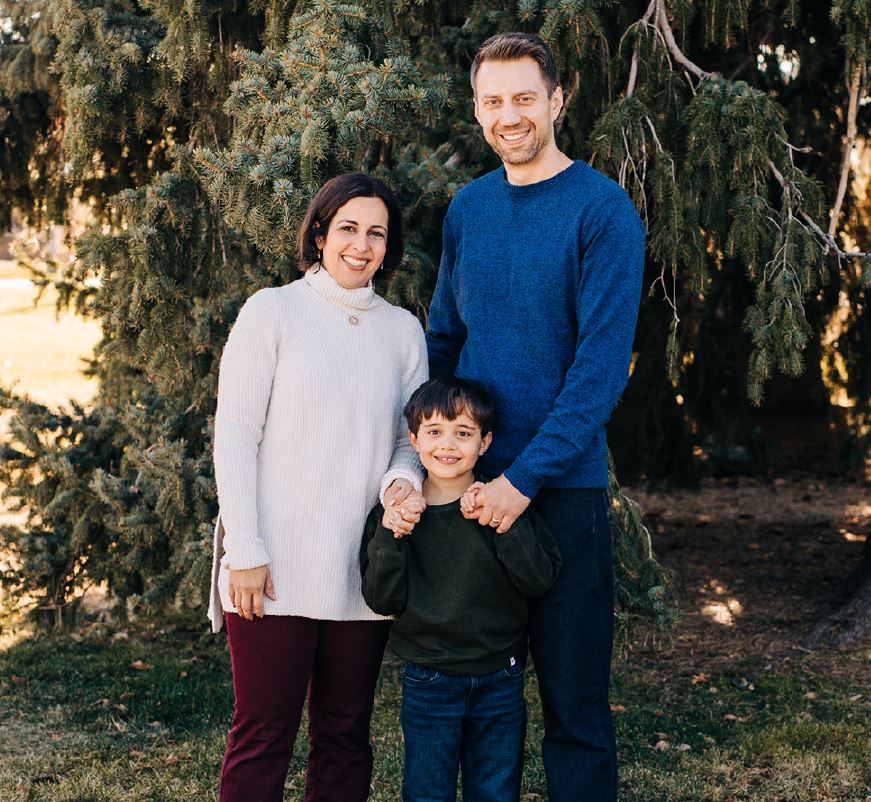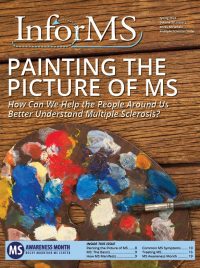
Lauren is 42 and was diagnosed with MS in 2011.
What were your earliest symptoms and how were you diagnosed with MS?
We were living in Austin, Texas at the time and I was getting intermittent pain in my left ear. I went to an Ear, Nose, & Throat specialist and primary care providers and had MRIs and blood vessel scans. No one could find an answer. Then I was referred to a pain specialist and he ordered a brain scan to make sure I didn’t have a tumor causing the pain. He called me and told me that there was no sign of a tumor, but he referred me to another neurologist. I wasn’t experiencing any other symptoms at that time, no fatigue or loss of vision.
The neurologist hadn’t reviewed any of my records prior to meeting with me. I was sitting next to him while he looked at my brain scans. I’m on pins and needles as he’s looking at the scans. Without turning to look at me he says, “Oh this looks like MS.” I immediately went into a panic and started hyperventilating. He still wasn’t looking at me; he was looking at the computer. He finally looked at me, realized I was hyperventilating and called a nurse into the room. The nurse sat with me and the first words out of my mouth were “Am I dying?”
Looking back at that appointment, it was a horrible way to receive that diagnosis in terms of empathy and giving someone the diagnosis of a chronic disease.
How has MS impacted your life?
MS takes up a lot of mental space in my life. I worry about it, and it presents me with anxieties. It’s always with me, every day. If I have some sort of symptom, I get worried, but that’s gotten better over time. In the beginning, it was a battle. I didn’t want it and it wasn’t fair. Now, it’s almost like a partner with me; I live with it. It’s a part of me, but it doesn’t define me.
At some points in my life, MS almost felt like a little child that I had to take care of. It feels like the better I take care of it, hopefully the less it will interfere with my life. If I keep myself healthy, manage stress, get good sleep – those are all things that I think will continue to help me feel good and to help to keep the disease quiet, and keep it from interfering with the things I want to do. In the beginning, I felt so powerless and out of control. The fact that I’m doing so well, does give me that sense of control. I’ve come to an acceptance about it. It’s been a process.
How has your perspective of MS changed over time?
It’s not an enigma anymore. The disease itself is kind of this black box in some ways — it can behave in different ways and affects people differently. My knowledge has improved and it’s not so scary to me. And learning how many people live with MS, makes it less scary.
The disease and my feelings around it have been incredibly complex. There are still days when I get mad at it. Especially with COVID, I got mad at Ocrevus because the risks were more unknown with COVID. I’ve had COVID twice and developed pneumonia and needed oxygen. COVID is also very much a mental diagnosis, and I have residual fear and anxiety about getting it again. That will probably always be there, but overall, I’m doing really well.
What does your support system look like?
My support system is anything that fills my cup. Volunteering with the MS Center fills my cup because it gives me an opportunity to be of service and reminds me to be humble and grateful that I’m doing so well. Talking with another person who lives with MS is an instant connection and wonderful source of support to me. And anytime that I meet someone– whether it’s chatting with someone in the waiting room while we’re waiting to get our blood drawn, or at an event, or even listening to a documentary with a person sharing their story—that always fills my cup because it reminds me that we can help support one another.
My family is a huge part of my support system. My husband who has loved me unconditionally. He’s said the things I’ve really needed to hear along the way, like “No matter what happens, I will take care of you.” And my whole family is so great about checking in with me after an MRI or after an infusion to see how I’m doing.
Self-care is also very important to me, and I think I look at it differently living with MS. There is so much that is completely out of my control. But what I can control is how I take care of myself – how I eat, how I exercise, how I manage my stress, and how I try to have a positive attitude.
What gives you hope?
For me, knowing that there are researchers and physicians furiously working non-stop to find medicines to help repair the damage that MS does. People are working so hard. All the people who donate their money and time and giving and being of service. That gives me hope.
My son and my family give me hope. I fight for them. They keep me in a good headspace and want me to be the best me and continue to be humble and grateful.



